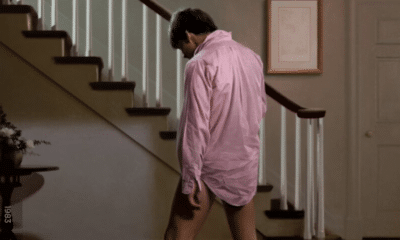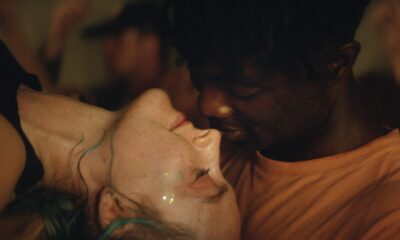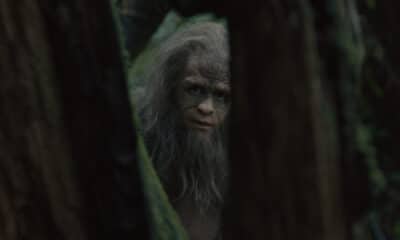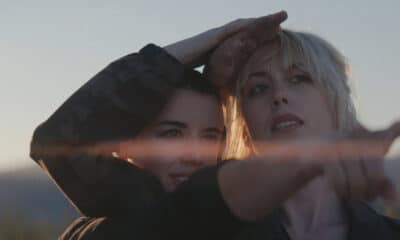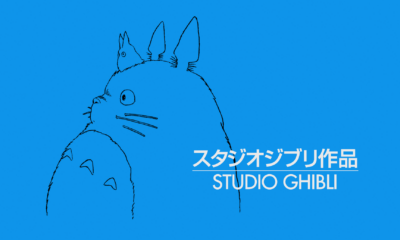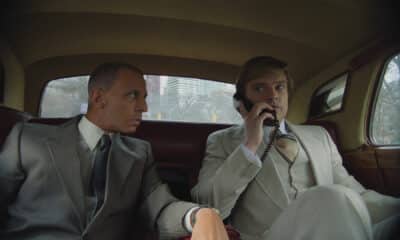The Swerve closed out this year’s digital Arrow Video FrightFest event to rapturous, and tear-stained, applause. The film, a feature debut from writer and director Dean Kapsalis, is a haunting psychological drama that follows one lonely woman’s spiral through mental illness, depression, and ultimately towards the unthinkable. It’s an incredibly powerful film, one that sticks with you long after viewing. It raises important, but uncomfortable, topics and urges the viewer to reassess themselves and those around them in hopes that they won’t succumb to the same fate.
Azura Skye takes on the role of a lifetime, playing the complex character of Holly: a wife, mother, daughter, sister, and teacher. That’s all. Life has stripped her of anything outside of these roles and, like many, Holly is struggling to maintain a healthy mental state. As pressures mount, she begins a dark journey from which there might not be any way back from. It’s a simply stunning performance from Skye, and one that we hope leads to more work for her within dramatic cinema. Those of a certain age will know that she started out in sitcom, Zoe, Duncan, Jack and Jane, playing sardonic Jane, as well as having a very memorable two-episode story arch on Buffy the Vampire Slayer, and a brief trip to Smallville. More recently, Skye popped up in Riverdale, but it’s fair to say she has never played anything quite like Holly. She even bagged the Best Actress trophy in Total Film’s annual FrightFest awards.
The collaboration between Syke and Kapsalis is a genuine work of art, it’s a film that deserves discovery and discussion. Having already discovered the film for ourselves through FrightFest, we decided to capitalise on the opportunity to sit down for a Zoom chat with both Dean Kapsalis and Azura Skye.

The Swerve closed this August’s FrightFest, what has the reaction from the screening been like?
AZURA SKYE: I was so thrilled and honoured to find out that I was named the best actress at the festival.
DEAN KAPSALIS: The reactions have been kind of overwhelming from FrightFest. Azura, the fans are so rabid for film and this festival, it’s really amazing. Everyone there, Paul McAvoy, Alan Jones, Greg [Day] and Ian [Rattray], warned me and they weren’t kidding. They just went nuts. My thumbs were tired from Twitter. I was getting so many messages.
AS: That’s so great to hear.
Dean, the film feels very personal, what was it that inspired the idea?
DK: It’s three fold. It started with an image that I started to draw of a woman in a supermarket and I wrote down ‘midnight at supermarket’. Then out of it came the character. I grew up around many strong women, and what I found as I grew up, there was domestic abuse, mental anxiety, and illness, without going into too much detail… So I think somewhere in my psyche, that sat. I was also really inspired by, and love, Greek tragedy and Shakespeare. Those all came together and I wanted to tell a story that had a lot of…I didn’t want to tell it through a social message film. I wanted to do it filtered through my love and appreciation of cinema and literature and art. Put those things front and centre through genre. I think it comes through best that way.
The part of Holly is so complex and demanding… Azura, what was it about her when you the script that made you want to tackle the role?
AS: I think from an actor’s point of view, it doesn’t really get any better than this. It’s very rare that you get this much to work with. It’s really an actor’s dream role in terms of being something to sink your teeth into. It’s certainly the best role I’ve ever had. It’s the scariest thing I’ve ever done. I’ve been doing this for quite a while, and I don’t really get nervous, I don’t really get scared, but I did on this one. It was a really exhilarating, exciting process. I know that I had not gotten a role this good before. I don’t know that I’ll ever get one again. I look at it as a tremendous gift and a phenomenal opportunity. I’m so grateful to Dean for the opportunity. When I read the script, I liked the script very much, I loved the character. I just had to be her. I just felt this thing in my gut that was telling me I have to do this. I’m so happy it all worked out.

I imagine it was a very emotionally gruelling character, how do you prepare for that and get into Holly’s head space?
AS: It was a tough one for sure. I used music a lot. Before we started shooting, I made a ‘Holly playlist’, that I still have, I find that helps a lot for me. I’m very affected by music. So just finding certain pieces of music that really brought me to that low, raw place. But doing this movie, going into it, it was such a massive amount of work ahead of me, I truly had to just take it one day at a time. If I thought of the weeks ahead of me, I would have crumbled under the pressure I think. I truly just had to take it one day at a time and we just plotted through it and I think it’s turned out pretty well.
Dean, when did you realise that Azura was Holly?
DK: I told Azura this – when me and Tommy [Minnix] saw your scene, Tommy immediately recognised you right of the bat. He said, ‘that’s Azura Skye, that’s Cassie from Buffy‘ etc. My head was in so many different things I just said, ‘that’s great.’ Then I saw the tape and thought, ‘she’s wonderful’, and that was it. I think Azura wanted to talk to me and Tommy and find out, ‘who are these guys?’ I would have done the same. Who are these guys? Where have they come from? What are they doing? Are they trustworthy? I understood that.
It took the first few days of shooting to find that rhythm and trust because a set is stressful and chaotic, and you’re always under time pressure. There’s technical things. Planes and cars and breakdowns with equipment etc. I don’t think she saw me smile too much because I was always in my head constantly thinking of…One time I remember I talking to Tommy and Azura walked in and said, ‘this is the happiest I’ve seen you’, because I was grinning over something.
AS: There was a lot going on. I’d see you smile occasionally. It was a serious piece, I’m not sure you were supposed to be smiling.

As a relatively new mother I found the film really resonated with me. There does seem to be this incredible pressure placed upon women to behave and act in certain ways once they become a mother, a wife, etc. The film demonstrates just how destructive this pressure can become. Are you hoping that people will start being nicer to their mums and giving them more of a break?
AS: Personally, I think that the only hope for humanity going forwards in terms of our evolution is if people are nice to their mothers. Also, mothers need to be nice to their children. It goes both ways. I think so much of the world, and so many of the problems are just grown-up people who are broken little children who were never able to figure that out, who are hurting and acting out and in pain. I think of that mother-child relationship is able to be a strong one, that sets a person up for the rest of their life. Really puts them on their course. Not to say we can’t overcome bad parents. Because lots of people can, and have to, but yes, be nice to your mothers by all means (chuckles).
DK: A message that’s within the film – but you may not notice it the first time – there are a lot of American flags in the film. The boys act a particular way because, in my view, America is a patriarchal society… I don’t know if it’s reached the UK yet, but something that really pissed me off this morning is our Speaker of the House Nancy Pelosi has been roundly criticised through the media because she got her hair done. They never ask men that. They don’t ask them if they got their haircut. It’s the most absurd thing. They would never ask a man that. I think that women are under enormous pressure. I saw it with my mother on a daily basis. I saw it with my aunts and my mother’s friends. I see it with friends with kids today. It’s an enormous amount of pressure they’re under. I really wanted to reflect that in the film.
AS: I’d just like to make a note on Dean’s point, which is for so many people, we’re raised with a certain ideology of what we’re supposed to be when we grow up and what is expected of us. I think so many people, women specifically, strive for this: husband, and 1.5 kids, and the house and the job. It’s supposed to be this dream and fantasy, but I think a lot of people living in that reality really find it to be a nightmare. And find it to be quite stifling. I think just acknowledging that [is great]. It’s like the white picket fence is not necessarily the reality, that all the connotations that come along with the apple pie and the white picket fence. It’s not the reality we’re living in or that so many people are living in. Not to say that a piece of that doesn’t still exist, it does, but it’s disappearing pretty quickly.
The film also focuses heavily on mental health. A lot of time in films, people with mental health problems are portrayed in a certain way, here, like you say, outwardly Holly has everything: the husband. house, job and kids. The Swerve highlights how silent a disease mental health problems are and how anybody can be affected by them. Are you hopeful the film will encourage discussions?
DK: Absolutely. Especially during this pandemic, there was some concern about it. What would people feel like? How is this going to come across? But if anything, a couple of the fellows at FrightFest were talking about it, that it seems to be hitting a zeitgeist. One thing I’ve noticed, just the other day, at least in America, the domestic abuse and suicide rates have gone sky high. Before the pandemic, they were already on the rise – men and women. It’s really distressing. I hope it is [going to encourage discussion]. The point of the finale of the film, and the entirety of it, is also catharsis. As humans we haven’t changed. If you read Sophocles, Euripides, they still touch upon the same issues that hit us. It’s a Möbius strip, we’re always going around and around and around and around. I think until we learn these lessons. I think it’s important to do that.I think films, art, should challenge it.
AS: Another note on that is I feel, just in terms of human behaviour throughout literature of the ages, I’m always so amused by that term inhumane… ‘oh that’s so inhumane.’ In fact, what they’re usually referring to is entirely humane because it’s only humans that treat each other this way. You don’t see animals treating each other the way that human beings do. So what we think of as inhumane sadly, seems to be specifically unique to humans and uniquely humane.
DK: I always find it remarkable when people see…movies should…to me they’re like waking dreams. You can get so tense or moved, or you feel such joy or terror, at a film. It’s the way it enters your psyche. But I think, the same thing goes about paintings. You see a painting by Francis Bacon and you can be startled by it and it can give you nightmares and frighten you. Everything is politicised, there’s something in there that I think hits us at a primal level, and that’s what I love about films. I think it’s very important to do that.

Apple pie plays a significant role in the film, and Azura, your character Holly eats a lot of the stuff. You hear horror stories about actors having to eat tons of a specific food item when filming eating scenes, how much pie did you end up consuming?
AS: A fair amount. I don’t think I consumed a whole pie by any means. But there were a few pieces. There’s one scene where, just for an entire take, the camera just sits on me, very uncomfortably, while I bite-by-bite consume this piece of pie. I think we only did a couple of takes of that. I wanna say two, maybe three. So I didn’t have to gorge myself too much.
DK: Azura was perfect, so there was no reason [to do more takes]. I don’t think she was aware until we were shooting that we were going to do that in one take. I said, ‘the camera is going to be here, we’re going to move slowly in on you as you eat, but you take your time. You just take it as if you have all the time in the world.’ We talked about it, and she did it, and you could hear a pin drop.
AS: Just the fork scraping the plate. By the way Dean, it’s one of my favourite scenes in the film.
DK: Mine too. I was gleeful. It was perfect. It was really, really wonderful. I didn’t know… she asked me, ‘how big of a bite do you want?’ I said, ‘you’re Holly, I’ll let you decide,’ and she took this enormous… and I to stifle a laugh, because I was sitting right by her off camera. I had to stifle a laugh because the piece was so big and that’s the take that we used.
AS: She likes her pie.
So Dean hasn’t ruined apple pie for you?
AS: Oh God no. It’s just a movie. It’s just pretend.
DK: We had some last week.
AS: I have no problem eating apple pie. I have no problem with mice. I have no problem with apple. It’s all fun and games.

Circling back to the reactions that people have had, have you noticed any difference in how men and women are reacting?
DK: The reaction from men and women have been remarkable. We didn’t know how it was going to hit, and it was a concern. While we were editing, we showed it to quite a few people back and forth. No joke, we’re stunned with the reaction. We’re very, very pleased. There are a lot of people that have pointed out critically they are bringing up their own bouts of mental anguish themselves, and how it hit them hard. I think some of them continue to do so on Twitter, they’ll say this one really hit them hard, made them think about a lot of things, but not in a negative way. I can’t speak for everybody, but largely it’s been very positive.
Which is obviously what you want.
DK: I tried to be as empathetic as possible. Some people… Tom the producer said, ‘Dean you gotta see this’, they were like, ‘we can’t believe a man made this film’. I don’t know quite what to say about that, I don’t quite know what that means. I mean, I know what it means, but I just try to be as empathetic as possible to the human condition.
AS: I was surprised though and thought it was very interesting that a man had written the script because it is such an intensely female story. He has tremendous insight into women clearly, which is rare. It was a real treat. I’m a big believer that men and women can work really well together and I thought it was a really nice collaboration. Had I not seen the writer’s name on the script, I think I would have just ignorantly assumed that it was a female. I think him telling a female story, but through him obviously not being a woman, gave it its own very interesting perspective. I think it also really speaks to the point that you don’t have to be a woman to tell a woman’s story. You don’t have to be a man to tell a man’s story. You don’t have to be African American to tell an African American story. You don’t have to be gay to tell a gay story. The art of storytelling is so broad and open for everyone. Everyone has different unique entry points into how to tell that story. Dean making this movie is a perfect example of that.

The film is out in the US on the 22nd September with a UK date hopefully not too far behind. Are you excited for America to finally get to see it?
DK: That’s putting it mildly. We’re very excited. It’s so much work, but it’s great. It’s really wonderful.
AS: It’s been a long time. We made this film over three years ago. It’s exciting that we’re finally getting to share it with people. It’s been about a year since I saw it, has it changed much?
DK: Not much, I think the colour might have changed slightly. It’s so weird, I’m not even sure what they showed at the FrightFest screening. I think it had an introduction and maybe a Q&A…
Yeah, there was a Q&A that played after the end credits, you know, as everyone was mopping up their tears.
AS: Mopping them up, I love it. Get your mops out!
DK: I sent quite a few virtual hug emojis out on Twitter to people. I was very pleased by the reaction to that, but also it’s a movie, it’s not real.
AS: It definitely is not the feel-good movie of the year. One might ask – things are tough enough out there – why do I want to watch this film? And I would say the reason for that is it shows you that things could really be worse. It could be so much worse, I say that in somewhat jest, but it is kind of true and puts things in perspective.
DK: It could possibly also instigate someone to push themselves out of their… for me, that’s a pleasure I get out of movies with endings that hit me hard – Night of the Living Dead, or Vertigo, or Breaking the Waves. Something unexpected that really hit me. Sometimes it would really upset me to the point that I would get angry and have to think it over and then go back to it, or let it settle in. Or it would push me to be a better person. That’s how I took movies when I was growing up. Books that would linger and hit me in a way that would inspire me. I hope in some way that The Swerve does that, that it could inspire people too.
AS: I think so to, and to digress to our previous point, just in a time where a lot of people are suffering with mental illness even more than usual perhaps, I think it really shines a light on that. I think there’s a lot to relate to. Hopefully not too much, but there’s a lot of suffering out of there, I think a lot of people are like Holly who are just keeping it together, like just barely keeping it all together, It’s like if one more domino tipped they would unravel, which is exactly what happens to Holly. It’s just that tenuous edge and unfortunately I think you see more and more people being pushed to that edge, and to that brink. So I think that it’ll speak to a lot of people.
The world film world has obviously slowed right down at the moment, but have you got anything else lined up once the world opens up again?
AS: I’m just gardening for the time being. I bake bread now. I would love to go back to work soon when it’s safe. I have no plans to do so as of yet. In the last couple of weeks, it kinda seems that things are starting to creep back a little bit so that seems to be on the horizon. But as for myself, I have no plans. I find one thing that’s been interesting about this pandemic is that as human beings we’re such planners, and it’s really hard to plan now. Not more than a couple of days ahead. I suppose in one way it really forces you to live in the present because I think we spend so much time living in the future and thinking about the things that we’re going to do and suddenly that’s been taken away from us.
DK: There’s been so much…even though we stopped shooting about three years ago, there’s been so much to do. To do it during a pandemic has been a balancing act. Things to do with tweaking the film in post, and colour-correcting something else, changing something in credits, deliverables for the distributor – it’s a lot. Then meanwhile, it’s working on something completely different, but hopefully it’ll be easy to spot my stamp on it.
The Swerve is released in the US on 22nd September 2020, with a UK release still to be confirmed.
Kat Hughes is a UK born film critic and interviewer who has a passion for horror films. An editor for THN, Kat is also a Rotten Tomatoes Approved Critic. She has bylines with Ghouls Magazine, Arrow Video, Film Stories, Certified Forgotten and FILMHOUNDS and has had essays published in home entertainment releases by Vinegar Syndrome and Second Sight. When not writing about horror, Kat hosts micro podcast Movies with Mummy along with her five-year-old daughter.

Latest Posts
-


Home Entertainment
/ 2 hours ago‘Risky Business’ and ‘Blow Out’ are getting the UK Criterion treatment
Risky Business and Blow Out will be released on UK Criterion 4K Blu-ray this...
By Paul Heath -


Film News
/ 2 hours agoRelease date announced for ‘The Outrun’ with Saoirse Ronan
After premiering at this year’s Sundance and the Berlinale in Germany, the UK release...
By Paul Heath -


Apple TV
/ 1 day agoTrailer: André Holland leads Apple’s new limited series, ‘The Big Cigar’
Apple TV+ has released the full trailer for The Big Cigar, a new, six-episode...
By Paul Heath -


Film News
/ 1 day agoUK trailer, poster and release date for Sundance smash ‘Sasquatch Sunset’
Premiering in the UK at the Sundance London event in June is the brilliant...
By Paul Heath
